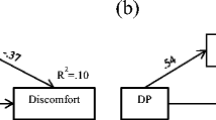Abstract
Using undergraduate students from the Waikato University in New Zealand as a sample, this study compared the ethical positions of students of different field of study and demographic characteristics. It was found that the ethical standard of business students are not significantly different from that of non-business students. The findings also suggest that female students are more ethical than male students, and senior students are more ethical than junior students.
Besides sex and year of study, other variables studied were parents' occupation, religiosity and household income of the students. All these variables were found to have no significant impact on the ethical position of the students. Furthermore, all the interaction effects between the variables studied and the students' major field of study were nonsignificant.
Similar content being viewed by others
References
Arlow, P.: 1991, 'Personal Characteristics in College Students' Evaluations of Business Ethics and Corporate Social Responsibility', Journal of Business Ethics 10, 63–69.
Arlow, P. and T. A. Ulrich: 1980, 'Business Ethics, Social Responsibility and Business Students: An Empirical Comparison of Clark's Study', Akron Business and Economic Review 11(3), 17–22.
Beltramini, R. F., R. A. Peterson and G. Kozmetsky: 1984, 'Concerns of College Students Regarding Business Ethics', Journal of Business Ethics 3, 195–200.
Betz, M., L. O'Connell and J. M. Sheppard: 1989, 'Gender Differences in Proclivity for Unethical Behaviour', Journal of Business Ethics 8, 321–324.
Borkowski, S. C. and Y. J. Ugras: 1992, 'The Ethical Attitudes of Students as a Function of Age, Sex and Experience', Journal of Business Ethics 11, 961–979.
Davis, J. R. and R. E. Welton: 1991, 'Professional Ethics: Business Students' Perceptions', Journal of Business Ethics 10, 451–463.
Drucker, P. F.: 1982, 'The Changing World of the Executive', Times Books.
Ferrell, O. C. and S. J. Skinner: 1988, 'Ethical Behaviour and Bureaucratic Structure in Marketing Research Organizations', Journal of Marketing Research (Feb.), 103–109.
Fritzsche, D.: 1988, 'An Examination of Marketing Ethics: Role of the Decision Maker, Consequences of the Decision, Management Position and Sex of the Respondent', Journal of Macromarketing (Fall), 29–39.
Hawkins, D. I. and A. B. Cacanougher: 1972, 'Students Evaluations of the Ethics of Marketing Practices: The Role of Marketing Evaluation', Journal of Marketing, 61–64.
Kraft, K. L.: 1991, 'The Relative Importance of Social Responsibility in Determining Organizational Effectiveness: Student Responses', Journal of Business Ethics 10, 179–188.
Kristol, I.: 1987, 'Ethics, Anyone? Or Morals?', Wall Street Journal (Sept. 15), 32.
Lane, M. S., D. Schaupp and B. Parsons: 1988, 'Pygmalion Effect: An Issue for Business Education and Ethics', Journal of Business Ethics 7, 223–229.
Lewin, T.: 1983, 'Business Ethics, New Appeal', New York Times (December 11), F3.
McNichols, C. W. and T. W. Zimmerer: 1985, 'Situational Ethics: An Empirical Study of Differentiators of Student Attitudes', Journal of Business Ethics 4, 175–180.
Meising, P. and J. F. Preble: 1985, 'A Comparison of Five Business Philosophies', Journal of Business Ethics 4, 465–476.
Murray, T. J.: 1987, 'Ethics Programs: Just a Pretty Face?', Business Month (Sept.), 30–32.
Rest, J. R.: 1988, 'Can Ethics be Taught in Professional Schools? The Psychological Research', Easier Said Than Done (Winter), 22–26.
Rohatyn, F. G.: 1988, 'Ethics in America's Money Culture', in Ethics in American Business: A Special Report (Touche Ross, New York).
Ruegger, D. and E. W. King: 1992, 'A Study of the Effect of Age and Gender upon Student Business Ethics', Journal of Business Ethics 11, 179–186.
Salmons, S.: 1987, 'Suddenly Business Schools Tackle Ethics', New York Times, Educational Life (Aug. 2), 64–69.
Shepard, J. M. and L. S. Hartenian: 1990, 'Egoistic and Ethical Orientations of University Student Toward Work-Related Decisions', Journal of Business Ethics 10, 303–310.
Stevens, G.: 1984, 'Business Ethics and Social Responsibility: The Responses of Present and Future Managers', Akron Business and Economic Review 15(3), 6–11.
Vogel, D.: 1987, 'Could An Ethics Course Have Kept Ivan From Going Bad?', Wall Street Journal 27, 24.
Author information
Authors and Affiliations
Rights and permissions
About this article
Cite this article
Tse, A.C.B., Au, A.K.M. Are New Zealand Business Students More Unethical Than Non-Business Students?. Journal of Business Ethics 16, 445–450 (1997). https://doi.org/10.1023/A:1017957210848
Issue Date:
DOI: https://doi.org/10.1023/A:1017957210848




